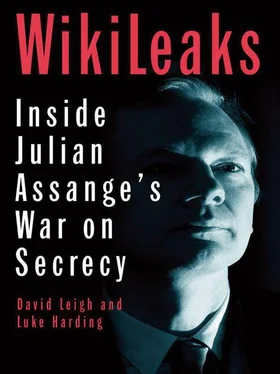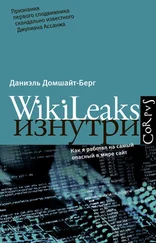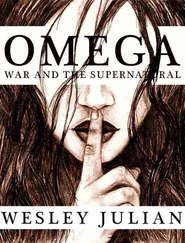Harding, Luke - WikiLeaks - Inside Julian Assange's War on Secrecy
Здесь есть возможность читать онлайн «Harding, Luke - WikiLeaks - Inside Julian Assange's War on Secrecy» весь текст электронной книги совершенно бесплатно (целиком полную версию без сокращений). В некоторых случаях можно слушать аудио, скачать через торрент в формате fb2 и присутствует краткое содержание. Жанр: Старинная литература, на английском языке. Описание произведения, (предисловие) а так же отзывы посетителей доступны на портале библиотеки ЛибКат.
- Название:WikiLeaks: Inside Julian Assange's War on Secrecy
- Автор:
- Жанр:
- Год:неизвестен
- ISBN:нет данных
- Рейтинг книги:3 / 5. Голосов: 1
-
Избранное:Добавить в избранное
- Отзывы:
-
Ваша оценка:
- 60
- 1
- 2
- 3
- 4
- 5
WikiLeaks: Inside Julian Assange's War on Secrecy: краткое содержание, описание и аннотация
Предлагаем к чтению аннотацию, описание, краткое содержание или предисловие (зависит от того, что написал сам автор книги «WikiLeaks: Inside Julian Assange's War on Secrecy»). Если вы не нашли необходимую информацию о книге — напишите в комментариях, мы постараемся отыскать её.
WikiLeaks: Inside Julian Assange's War on Secrecy — читать онлайн бесплатно полную книгу (весь текст) целиком
Ниже представлен текст книги, разбитый по страницам. Система сохранения места последней прочитанной страницы, позволяет с удобством читать онлайн бесплатно книгу «WikiLeaks: Inside Julian Assange's War on Secrecy», без необходимости каждый раз заново искать на чём Вы остановились. Поставьте закладку, и сможете в любой момент перейти на страницу, на которой закончили чтение.
Интервал:
Закладка:
Reaching out to Muslim Voters
7. (C) Ten people (including Poloff) showed up at an event aimed at improving Labour outreach to Muslim communities. (Embassy comment: Given Labour’s loss of Muslim support following the Iraq War, the low turnout by party activists at this event was inexplicable. End comment.) Manchester Councilor and former Lord Mayor Afzal Khan provided recommendations to Labour candidates looking for votes in Muslim communities, including: use “As Salam Aleikum” as a greeting; don’t get hung up on shaking hands with females; call into Muslim radio programs; send cards for Muslim religious holidays; and wait outside mosques on Friday to hand out leaflets. Labour MEP Gary Titley from Bolton also provided the earnest advice to avoid assuming that all Muslims hold identical views and to maintain links with community-based organizations. One British Muslim from Nottingham rose to describe what he felt was suppression of a large Muslim contingent in his local Labour party; Khan told him there was a democratic process and the Muslims in Nottingham should use it.
8. (SBU) Secretary for Communities and Local Government Hazel Blears led the way on Labour’s achievements in local government. Birmingham’s revitalized town center, including the conference center that was the venue for the event, were held up as Labour achievements, as was London Mayor Ken Livingstone’s record in “revitalizing London.” In break out groups, however, there was one ominous session on “effective opposition.” Labour members complained that for Labour councilors – who are on the front lines, so to speak, against Tory and LibDem-dominated councils – there is little or no support from the party in either substantive policy terms or personal assistance.
Miliband’s Star Power
9. (C/NF) In an otherwise low key conference, the frisson of excitement whenever Foreign Secretary David Miliband appeared was palpable. The European Parliament Labour Party lunch-time event on the Lisbon Treaty that featured Miliband as speaker drew a packed hall. He followed that appearance by a session with over a hundred Labour Students who clearly idolized him. Stumbling into what was belatedly revealed as a “private session,” Poloff heard Miliband outline his criteria for a “successful country” of the future: openness, empowerment of the whole population, and global linkages. There is increasingly less of a distinction between foreign and domestic policies, he told the students, and the challenge is to mobilize people to change. The lessons of the 80s and 90s are that “rainbow coalitions don’t work;” in order to mobilize “dynamic forces,” political leaders must develop a unifying narrative or ideology. In this respect, Labour must decide if it is the party of the working class or the party of the middle class. Answering questions on foreign policy, Miliband supported UN reform and noted the “real issue” at the UN is the UN’s failure to deliver on its “responsibility to protect,” because most threats to civilians come from their own governments and not foreign invasions. He defended UK participation in China’s Olympic games as an opportunity to shine a light on “the real China, warts and all.” He emphasized that Iran represented dangers not just in nuclear weapons development and support for terrorism but also through its own domestic human rights practices; for example, he noted that Iran has the highest per capita rate of capital punishment in the world.
Comment
10. (C/NF) Labour members have been increasingly asking themselves the same question raised by the student from Cardiff: what makes Labour “radical” after nearly 11 years in government? For a party that still contains a large element who feel more comfortable in opposition, such self-questioning contributes to a feeling of post-Blair rudderlessness. Even though Blair ended up unpopular, he was the sun around which the party orbited, and his speeches, no matter the content, sparked an emotional response. Brown’s earnest and praiseworthy vision excites no opposition and yet it seems to excite no great enthusiasm either. With two months to go before local elections, a financially-constrained Labour hardly seemed on the verge of mobilizing for a campaign that will not only determine Labour’s fortunes on the local level, but may also affect Gordon Brown’s own tenure as leader. The poorly attended conference lacked the buzz that a strong parliamentary party representation would have provided and, Miliband’s star power notwithstanding, there was no catwalk of prospective challengers to Brown. But the irony of Labour’s holding up Ken Livingstone as a model of Labour achievement, only eight years after his expulsion from the party for running for London mayor as an independent, was not lost on the UK media.
TUTTLE
MOSCOW MAYOR OVERSEES
CORRUPT SYSTEM, SAYS US
Friday, 12 February 2010, 15:39
SECRET SECTION 01 OF 03 MOSCOW 000317
SIPDIS
EO 12958 DECL: 02/11/2020
TAGS PGOV, PREL, PHUM, PINR, ECON, KDEM, KCOR, RS”>RS
SUBJECT: THE LUZKHOV DILEMMA
Classified By: Ambassador John R. Beyrle. Reason: 1.4 (b), (d).
1. (C) Summary: Moscow Mayor Yuriy Luzhkov remains a loyal member of United Russia, with a reputation for ensuring that the city has the resources it needs to function smoothly. Questions increasingly arise regarding Luzhkov’s connections to the criminal world and the impact of these ties on governance. Luzhkov remains in a solid position due to his value as a consistent deliverer of votes for the ruling party. Unfortunately, the shadowy world of corrupt business practices under Luzhkov continues in Moscow, with corrupt officials requiring bribes from businesses attempting to operate in the city. End Summary.
Overview: The Kremlin’s Luzhkov Dilemma
2. (C) Moscow Mayor Yuriy Luzhkov is the embodiment of political dilemma for the Kremlin. A loyal, founding member of United Russia and a trusted deliverer of votes and influence for the ruling party and its leader, Prime Minister Putin, Luzhkov’s connections to Moscow’s business community – the big and legitimate as well as the marginal and corrupt – has enabled him to call for support when he needs it, to deliver votes for United Russia, or to ensure that the city has the resources it needs to function smoothly. Luzhkov’s national reputation as the man who governs the ungovernable, who cleans the streets, keeps the Metro running and maintains order in Europe’s largest metropolis of almost 11 million people, earns him a certain amount of slack from government and party leaders. He oversaw what even United Russia insiders acknowledge was a dirty, compromised election for the Moscow City Duma in October, and yet received only a slap on the wrist from President Medvedev.
3. (C) Muscovites are increasingly questioning the standard operating procedures of their chief executive, a man who, as of 2007, they no longer directly elect. Luzhkov’s connections to the criminal world and the impact that these ties have had on governance and development in Moscow are increasingly a matter of public discussion. Although Luzhkov was successful in winning court-ordered damages from opposition leader Boris Nemtsov for his recent publication “Luzhkov: An Accounting,” Nemtsov and his Solidarity-movement allies were heartened by the fact that the judge did not award damages on the basis of the corruption accusations themselves, but rather on a libel technicality.
4. (C) Few believe that Luzhkov will voluntarily relinquish his post prior to 2012, when the Moscow City Duma must submit a list of mayoral candidates to Medvedev for his selection. United Russia will probably call on Luzhkov’s political machine and his genuine public support to deliver votes for them in the 2011 State Duma elections, as well as the 2012 Presidential contest. With no apparent successor in line, and with no ambitions beyond remaining mayor, Luzhkov is in a solid position. The evidence of his involvement – or at least association – with corruption remains significant. This cable presents that side of Luzhkov – one that bears not only on Luzhkov and his handling of local politics, but on Putin and Medvedev as they move toward the 2012 elections.
Читать дальшеИнтервал:
Закладка:
Похожие книги на «WikiLeaks: Inside Julian Assange's War on Secrecy»
Представляем Вашему вниманию похожие книги на «WikiLeaks: Inside Julian Assange's War on Secrecy» списком для выбора. Мы отобрали схожую по названию и смыслу литературу в надежде предоставить читателям больше вариантов отыскать новые, интересные, ещё непрочитанные произведения.
Обсуждение, отзывы о книге «WikiLeaks: Inside Julian Assange's War on Secrecy» и просто собственные мнения читателей. Оставьте ваши комментарии, напишите, что Вы думаете о произведении, его смысле или главных героях. Укажите что конкретно понравилось, а что нет, и почему Вы так считаете.












